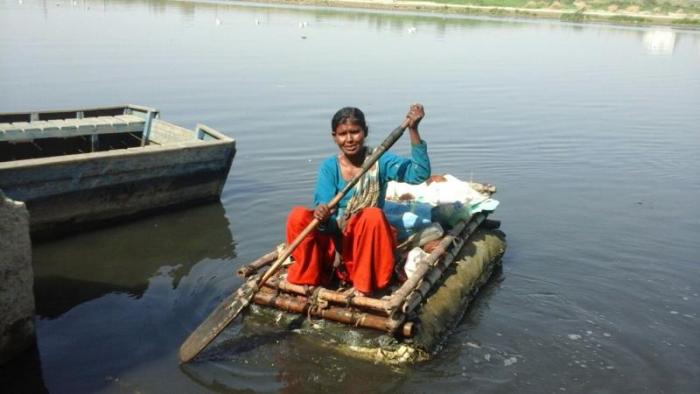
Bangladeshi migrants clean filthy Yamuna river in search of livelihood
The river Yamuna is choked with all kinds of filth- plastic water bottles, poly bags, rubber, flower garlands and coconuts thrown during the Hindu death rituals. This waste, however, is the source of livelihood for some people living at Yamuna Nagar near Nigambodh Ghat.
They row boats throughout the day and sieve all possible waste materials which could be sold to junk dealers. These people are migrants from Bangladesh who entered India through Bengal and have been living here since many years.
“I came to Delhi as there was no source of livelihood in Bengal because Hooghly is a clean river,” says Ganga Devi (name changed), a widow and a mother of three. Ganga collects plastic waste, water bottles, chappals, coconuts from the river and sells them to the nearby junk dealers.
“I get Rs 6-8 per kg for selling white plastic bags which are expensive. The rates are less for coloured plastic bags. I earn Rs 2 for plastic water bottle and Rs 5 for glass bottles,” she says.
Ravinder Sharma, who resides near the ghat tells that they collect the coconuts from the river, thrown during Narayanvali and Pinddan and sell them to the hawkers near the temples for re-use.
Ganga earns approximately Rs 500 per day and manages to send one of her child to English medium school. The family lives near Nigambodh Ghat in a shanty.
“I don’t want to go back to Bengal as there is no work opportunity for me. I do this cleaning work. My son does not go to school, he works at a farm. My wife recently had surgery to remove a kidney stone and she is still on bed rest. We are settled here, and I don’t want to leave this place,” asserts Noor Ali, another cleaner.
The locals tell that these cleaners are actually migrants from Bangladesh who entered India through Bengal. As their country is poverty stricken, they migrate to India in search of a livelihood. Some of them even possess adhar card and voter ID.
Even though they are doing it for their own livelihood, they are at least helping in cleaning up the filthy Yamuna while the locals continue to pollute the river by dumping waste, bathing and washing clothes in the water.
(Originally published in the DNA, India.)